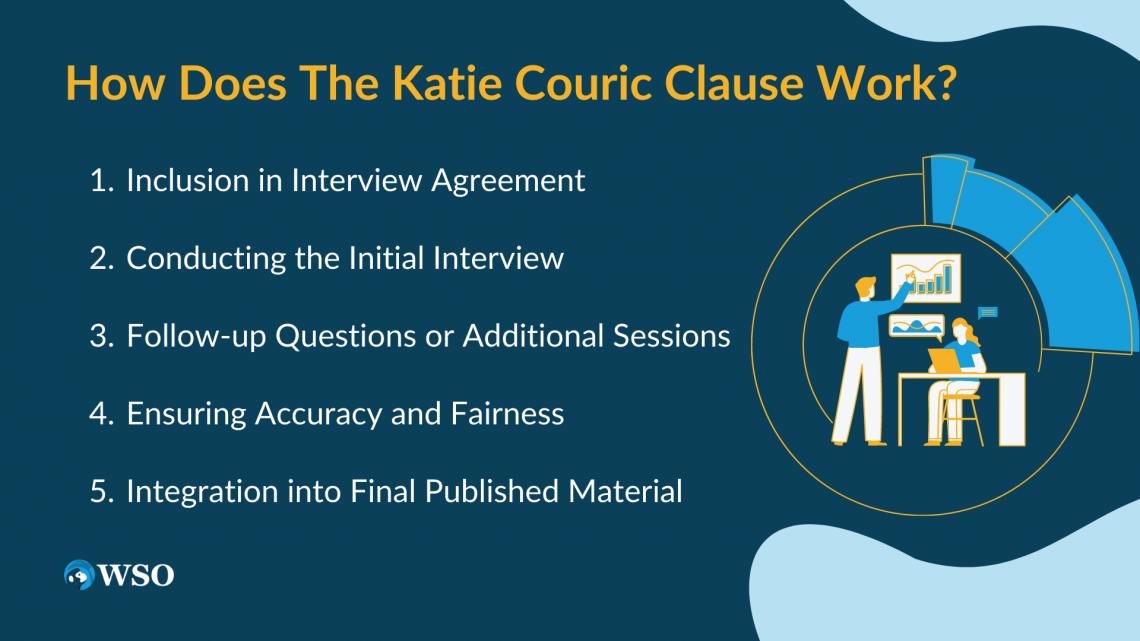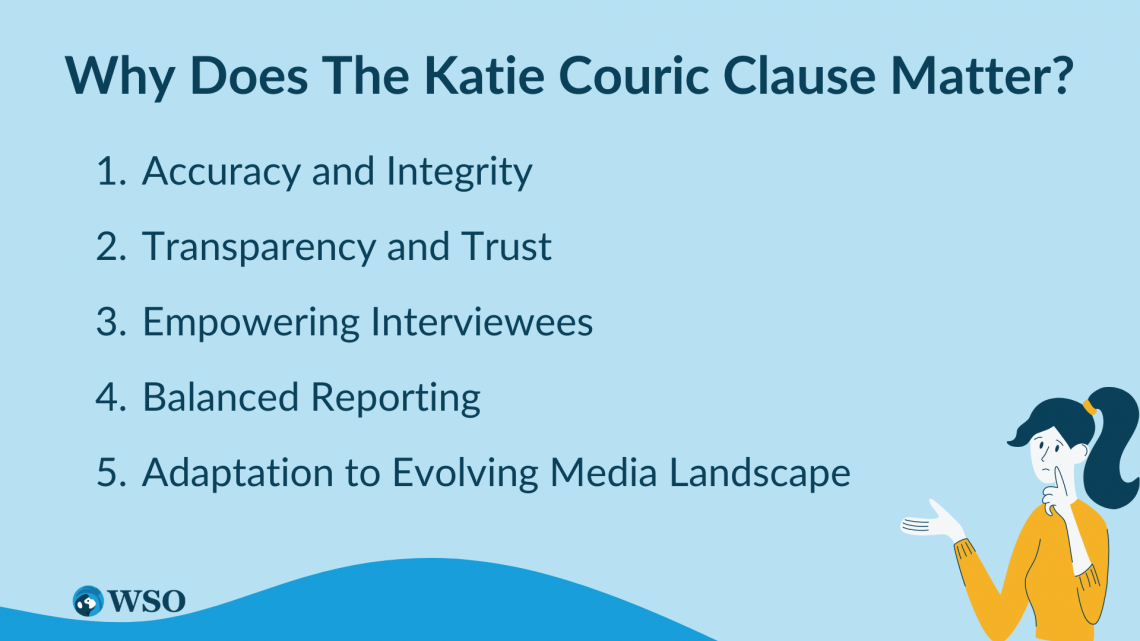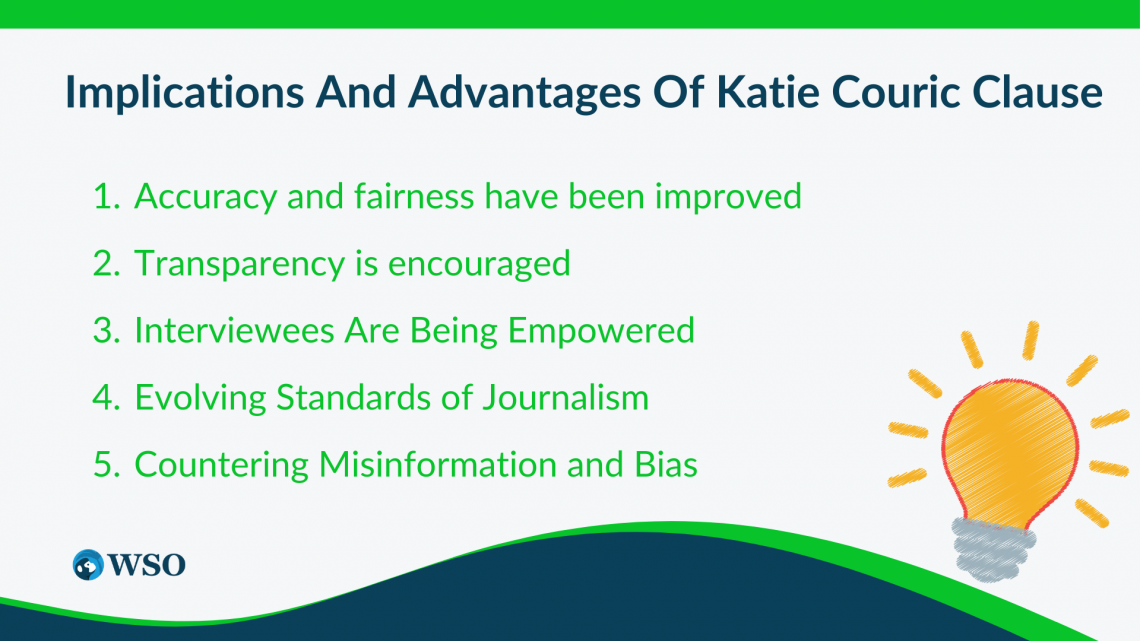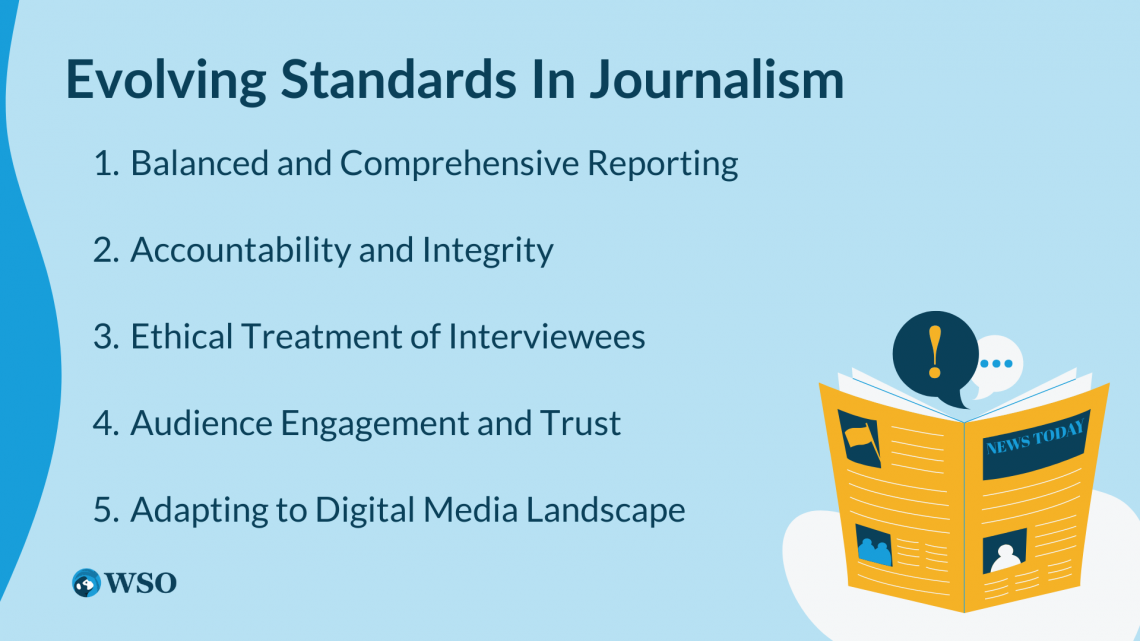Katie Couric Clause
This Clause, named after journalist Katie Couric, is a condition in interview contracts allowing follow-up questions or further sessions with interviewees.
What is the Katie Couric Clause?
This clause is named after the American journalist and television personality Katie Couric, who reportedly requested such provisions in her contracts during her tenure as a news anchor.

The Katie Couric Clause emerged in response to the increasing influence and power of individuals who are the subjects of documentaries or interviews. It aims to address concerns regarding the subject's accuracy, fairness, and overall portrayal in the final production.
By allowing the subject to review and potentially modify the content, the clause allows them to ensure their perspective is accurately represented and to address any factual inaccuracies or misrepresentations.
Critics of the Katie Couric Clause argue that it compromises the objectivity and integrity of the documentary or interview. They contend that it gives the subject an undue level of control over the final product, potentially leading to a sanitized or biased representation.

It can also create conflicts of interest between the filmmaker or interviewer and the subject, as the desire to maintain access or appease the subject's requests may influence the integrity of the work.
Proponents of the clause argue that it provides a necessary level of transparency and fairness. Additionally, they argue that this provision can incentivize subjects to participate in interviews or documentaries, as it offers them a level of reassurance and protection.
The use and acceptance of the Clause can vary within the industry and depend on the specific circumstances and stakeholders involved.

Filmmakers, journalists, and media organizations often weigh the potential benefits and drawbacks when deciding whether to include such provisions in contracts.
Some may opt for a compromise, allowing subjects a limited right to review certain portions of the content without granting full editorial control.
The Katie Couric Clause represents an ongoing discussion and negotiation between the need for journalistic integrity and the desire to give subjects a fair representation.
As the media landscape continues to evolve, the debate surrounding this clause is likely to persist, shaping the dynamics between journalists, filmmakers, and the subjects of their work.
Key Takeaways
- The Katie Couric Clause, named after journalist Katie Couric, is a condition in interview contracts allowing follow-up questions or further sessions with interviewees.
- It improves reporting accuracy and integrity by ensuring that interviewees' points of view are correctly reflected and eliminating the possibility of misinterpretation or distortion.
- The Katie Couric Clause promotes fair reporting by allowing journalists to dive further into the issue and give a complete picture.
- It reflects a response to the changing media landscape, addressing biased editing, distortion, and interview manipulation issues.
- By embracing the clause, journalists respect responsible media ideals such as accuracy, openness, impartiality, and inclusion.
- The Clause involving Katie Couric had a significant influence on journalism, pushing other journalists and news organizations to follow suit.
- It represents a change in the profession toward better standards, stressing responsibility, ethical treatment of interviewees, and retaining audience confidence.
Understanding the Katie Couric Clause
The Clause involving Katie Couric refers to a provision incorporated into interview agreements allowing follow-up questions or additional sessions with interviewees.

The Katie Couric Clause deviates from the traditional interview format, where interviews are conducted and then edited to construct a narrative.
This may involve conducting a separate session to ask follow-up questions, seeking clarification, or providing an avenue for the interviewee to expand on their initial responses.
By incorporating the clause for Katie Couric, journalists aim to promote accuracy, transparency, and fairness in reporting. The provision allows interviewees to elaborate on their viewpoints, correct any potential misinterpretations, or provide additional context.
Note
This approach empowers interviewees by ensuring their voices are accurately represented and contributes to a more informed and well-rounded conversation.
The Clause for Katie Couric has had a significant impact on the field of journalism, inspiring other journalists and news organizations to adopt similar practices. It reflects an evolving set of standards prioritizing balanced reporting, accountability, and ethical treatment of interviewees.
By embracing this clause, journalists aim to foster trust with their audience and maintain the integrity of their profession in an ever-changing media landscape.
Origins Of The Katie Couric Clause
This interview not only had significant political ramifications but also marked a turning point in how interviews were conducted. During the Sarah Palin interview, Couric introduced a groundbreaking provision known as the Clause for Katie Couric.

This clause deviated from the conventional interview format by incorporating an additional session where follow-up questions were posed to ensure a comprehensive understanding of the interviewee's perspectives.
This departure from the traditional approach, where interviews were edited to construct a narrative, brought a fresh perspective to the interview process.
Introducing the Clause involving Katie Couric sparked intrigue and debate within the journalism community. It challenged the status quo and prompted a reevaluation of interview practices.
This innovation by Couric demonstrated a willingness to evolve and adapt to the changing media landscape, paving the way for a new era of more empowering and transparent interviews.
Note
The impact of the Clause involving Katie Couric extended far beyond that singular interview. It influenced and inspired journalists and news organizations worldwide to reevaluate their interview methodologies, leading to a significant shift in the way interviews were conducted and perceived.
The Clause involving Katie Couric marked a significant milestone in journalism's evolution, reflecting a growing recognition of the importance of accuracy, transparency, and inclusive dialogue.
Its introduction set in motion a series of changes that continue to shape the field of journalism, fostering a more accountable and ethical approach to interviewing.
How Does The Katie Couric Clause Work?
The "Katie Couric Clause" is a contractual term or agreement that specifies particular criteria or obligations relating to a notable figure in the media or entertainment industry's look, conduct, or performance.

Katie Couric, a well-known American journalist and television personality, inspired the Clause name.
While the specifics and variants of the Clause may vary based on the circumstances and parties involved, the clause's overall goal is to safeguard the reputation and image of the individual or business with whom the clause is linked.
Because of Couric's remarkable career and status as a trailblazer in the realm of broadcast journalism, this clause has received attention and significance.
Note
Understanding the mechanics and ramifications of the Katie Couric Clause can throw light on how contractual agreements in the media and entertainment industries strive to regulate and sustain high-profile personalities' public reputations.
The Katie Couric Clause operates by introducing a provision into interview agreements allowing follow-up questions or additional sessions with interviewees.
1. Inclusion in Interview Agreement
The Clause involving Katie Couric is incorporated into the interview agreement between the journalist, interviewee, or their representatives. This clause outlines the provision for follow-up questions or additional sessions beyond the initial interview.
2. Conducting the Initial Interview
The journalist conducts the initial interview with the interviewee, focusing on the agreed-upon topics or subject matter.
Note
The interview may follow a traditional format, with the journalist asking questions and the interviewee providing their responses.
3. Follow-up Questions or Additional Sessions
After the initial interview, the Clause involving Katie Couric comes into effect. The journalist may schedule a separate session or communicate with the interviewee to ask follow-up questions or seek clarification on specific points discussed during the interview.
4. Ensuring Accuracy and Fairness
The purpose of the Clause involving Katie Couric is to promote accuracy and fairness in reporting. The journalist aims to ensure that the interviewee's perspectives are accurately represented by conducting follow-up questions or additional sessions.
This helps to avoid misinterpretations, misquotations, or the distortion of the interviewee's viewpoints.
5. Integration into Final Published Material
The information gathered from the initial interview and any follow-up sessions is integrated into the final published material, such as an article, television segment, or online content.
The journalist strives to accurately reflect the interviewee's viewpoints, incorporating any clarifications or additional context obtained during the follow-up process.
Note
The Clause for Katie Couric operates as a tool for journalists to engage in more comprehensive and transparent interviews. It allows interviewees to contribute to the accuracy and depth of the final reporting, ensuring their voices are heard and represented authentically.
Why Does The Katie Couric Clause Matter?
The Katie Couric Clause is significant in the field of contractual agreements in the media and entertainment sector, owing to Katie Couric's powerful career and effect.

As a prominent American journalist and television personality, Couric has established a reputation for her professionalism, credibility, and versatility across various media platforms.
The clause named after her serves as a means to protect the interests, image, and reputation of high-profile figures in the industry.
Note
Understanding the significance and ramifications of the Katie Couric Clause gives insights into how contractual agreements are used to manage the issues of maintaining public perception and media celebrities' integrity in an ever-changing media ecosystem.
The Clause involving Katie Couric holds significant importance in the field of journalism for several reasons:
1. Accuracy and Integrity
The clause promotes accuracy and integrity in reporting by allowing journalists to ask follow-up questions or conduct additional sessions with interviewees. By striving for accuracy, journalists uphold the fundamental principles of responsible journalism.
2. Transparency and Trust
The Clause involving Katie Couric fosters transparency in the interview process. By incorporating additional sessions or follow-up questions, journalists reveal the behind-the-scenes dynamics of interviews to their audience.
This transparency helps build trust with the audience, demonstrating a commitment to open and honest journalism.
Note
The transparency counters skepticism and distrust by providing a clearer understanding of the interview process.
3. Empowering Interviewees
The clause empowers interviewees by allowing them to elaborate on their responses, provide additional context, or correct any misunderstandings. This is especially valuable for interviewees who may be inexperienced, marginalized or have complex viewpoints.
4. Balanced Reporting
By incorporating the Clause for Katie Couric, journalists strive for more balanced reporting. The follow-up questions or additional sessions allow for a more comprehensive exploration of the subject matter, enabling journalists to present a well-rounded perspective.
5. Adaptation to Evolving Media Landscape
Adopting the Clause involving Katie Couric reflects an adaptation to the evolving media landscape, particularly in the era of social media and citizen journalism. It addresses concerns about biased editing, misrepresentation, or manipulation of interviews.
By embracing this clause, journalists can proactively respond to the challenges posed by digital media, build credibility, and differentiate themselves in an environment saturated with information.
Note
The Clause involving Katie Couric matters because it promotes accuracy, transparency, and fairness in journalism. By adopting this clause, journalists uphold the principles of responsible journalism, ensuring that interviews are conducted to respect the voices and viewpoints of those being interviewed.
Implications And Advantages Of Katie Couric Clause
The Katie Couric Clause, a contractual provision named after the renowned journalist and television personality, carries significant implications and advantages within the media and entertainment industry.

This clause serves as a powerful tool for safeguarding the interests and reputation of high-profile figures in an increasingly scrutinized and dynamic media landscape.
The Clause involving Katie Couric has brought forth several implications and advantages that have had a transformative effect on the field of journalism. These include:
1. Accuracy and fairness have been improved
The Katie Couric Clause encourages truth and impartiality in reporting by adding the option of follow-up questions. It provides a chance for respondents to elaborate on their comments, clarify any misconceptions, or give extra context.
Note
This method decreases the possibility of misrepresenting or distorting an interviewee's beliefs, resulting in a more accurate depiction of their views.
2. Transparency is encouraged
The addition of the Katie Couric Clause encourages transparency in the interview process. Journalists may highlight behind-the-scenes dynamics by conducting more sessions with follow-up questions, giving audiences a better picture of how interviews are handled.
3. Interviewees Are Being Empowered
One significant advantage of the Clause involving Katie Couric is its ability to empower interviewees, particularly those who may be inexperienced or marginalized. This provision acknowledges that individuals may require more time or assistance to express their ideas fully.
Note
By granting interviewees the opportunity for follow-up questions, the clause ensures their voices are heard accurately, fostering a more inclusive and equitable media environment.
4. Evolving Standards of Journalism
Adopting the Katie Couric Clause reflects an evolving set of standards in journalism. It highlights a shift towards prioritizing accuracy, integrity, and ethical treatment of interviewees.
This clause encourages journalists to avoid sensationalism and instead focus on providing comprehensive, well-rounded perspectives.
5. Countering Misinformation and Bias
The Clause involving Katie Couric is a proactive measure to counter misinformation and bias. Journalists can address potential misconceptions and ensure accurate reporting by engaging in follow-up questions and allowing interviewees to clarify their statements.
This approach helps to combat the spread of false information and provides a platform for balanced, well-informed discussions.
Note
The Clause for Katie Couric has profound implications and advantages within the field of journalism.
This clause has significantly shaped how interviews are conducted by promoting accuracy and transparency and empowering interviewees by setting higher standards for ethical and inclusive reporting.
Evolving Standards In Journalism
The introduction and adoption of the Katie Couric Clause exemplify the evolving standards in the field of journalism. Here are some key aspects highlighting the evolving standards in journalism:

1. Balanced and Comprehensive Reporting
The Katie Couric Clause has contributed to a shift towards more balanced and comprehensive reporting. By incorporating follow-up questions, journalists can delve deeper into the interviewee's viewpoints and ensure a more nuanced understanding of complex issues.
2. Accountability and Integrity
Adopting the Clause for Katie Couric reflects an increased emphasis on accountability and integrity in journalism.
3. Ethical Treatment of Interviewees
The Clause for Katie Couric underscores the importance of the ethical treatment of interviewees. It recognizes that interviews are opportunities for journalists to extract information and platforms for individuals to express their perspectives.
Note
By allowing interviewees to provide additional context or correct any misinterpretations, this clause ensures that their voices are respected and accurately represented in the final published material.
4. Audience Engagement and Trust
Evolving standards in journalism prioritize audience engagement and trust. Including Katie, Couric Clause helps build a stronger bond between journalists and their audience.
By revealing the process of interviews and allowing follow-up questions, journalists demonstrate a commitment to transparency and openness.
Note
This approach fosters trust in the media, as audiences can witness firsthand the efforts made to provide accurate and comprehensive information.
5. Adapting to Digital Media Landscape
Journalists now face increased scrutiny and competition from citizen journalism and online platforms. The Katie Couric Clause represents a proactive adaptation to the digital era.
By incorporating deeper engagement with interviewees and emphasizing accuracy, journalists can differentiate themselves from the noise of misinformation and build a stronger online presence based on credibility and trust.
The adoption of the Katie Couric Clause exemplifies the evolving standards in journalism. It signifies a shift towards balanced reporting, accountability, ethical treatment of interviewees, audience engagement, and adaptation to the digital media landscape.
Katie Couric Clause FAQs

It is a provision in interview agreements allowing follow-up questions or additional sessions with interviewees. It is named after journalist Katie Couric, who popularized this approach during her interview with Sarah Palin in 2008.
The clause is named after Katie Couric because she introduced and popularized this approach during her high-profile interview with Sarah Palin.
The interview garnered significant attention and became an example of the benefits of conducting follow-up questions or additional sessions with interviewees.
The purpose of the Katie Couric Clause is to enhance the interview process by allowing journalists to seek further information, clarification, or elaboration from the interviewee.
The Katie Couric Clause benefits journalism by promoting accuracy, transparency, and fairness. It allows journalists to engage in more comprehensive dialogues with interviewees, facilitating a deeper exploration of the subject matter.
This clause empowers interviewees by allowing them to elaborate on their responses, provide additional context, or correct any misunderstandings. It also helps to build trust with the audience and ensures a more balanced representation of diverse viewpoints.
While the term "Katie Couric Clause" may not be universally adopted, the concept of conducting follow-up questions or additional sessions with interviewees has gained recognition in journalism.
Many journalists and news organizations have embraced this approach to ensure accurate and comprehensive reporting. The Katie Couric interview with Sarah Palin was a notable example that popularized this practice.




or Want to Sign up with your social account?